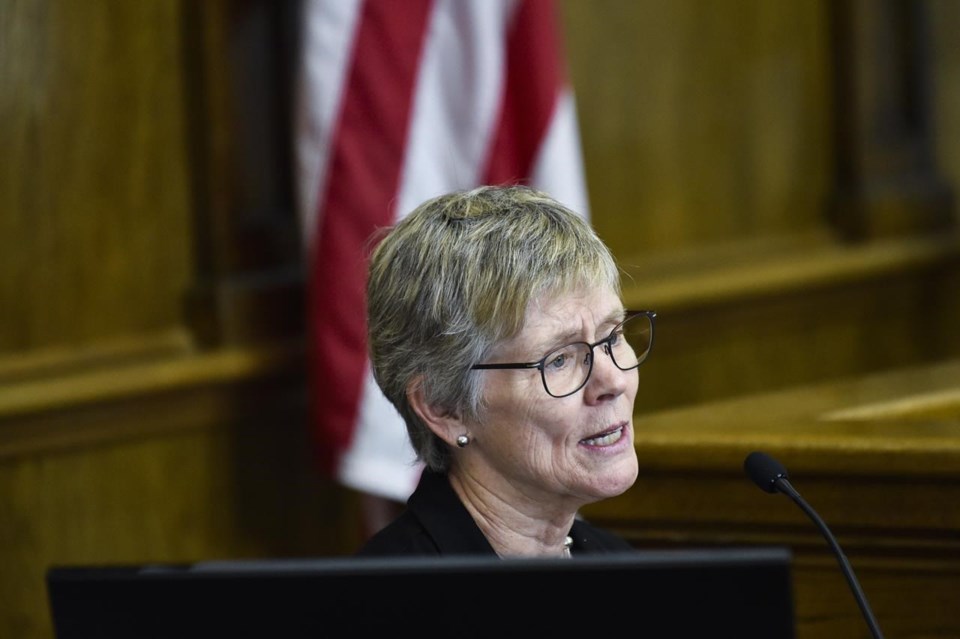HELENA, Mont. (AP) — A high school athlete who along with 15 other young people over climate change testified Tuesday that increased smoke from forest fires makes it difficult for him to compete and that a doctor prescribed an inhaler to help his breathing problems.
Mica Kantor, now 15, said he has been worried about climate change since as a 4-year-old he dictated a letter to Sen. Jon Tester, D-Mont., because he was too young to write it himself. He said it's increasingly difficult to run or go on hikes with his family, and that the warmer conditions have shortened snowboarding seasons.
Mica testified on day two of a first-of-its-kind trial in which the 16 young Montana residents are arguing the state is violating their constitutional rights by failing to keep the environment clean. They're asking a judge a state law that prevents agencies from considering the effect of greenhouse gasses when they issue permits for fossil fuel development.
State officials have sought to downplay Montana’s contributions to global warming as the trial is being closely watched for possible legal precedents.
Attorneys for the plaintiffs showed the court photos of Mica participating in protests against climate change at school, the local courthouse and the state’s largest public utility. He said his efforts were meant “to get people to think about climate change, which is the first step to acting,"
He said worrying about climate change can make it hard for him to fall asleep at night and he hopes the state will move in a direction that gives him hope for the future.
He shared a poem about being quarantined in the basement of his house when the rest of his family had COVID-19 and it was too smoky to play outside. In his writing, he wondered why nobody was listening and whether they cared.
The state declined to cross examine Mica or Badge Busse, 15; and did not ask questions of the three young plaintiffs who testified Monday.
Badge testified Tuesday that climate change can restrict his outdoor activities, including hunting, fishing and downhill skiing. There was a time, he said, when a forest fire near his house forced his family to prepare to evacuate, calling it “one of the most terrifying experiences of my life.”
His mother gathered baby books and he had to gather some of his treasured belongings and prepare to leave the only home he'd ever known. Fortunately, he said, they did not have to leave.
Pediatrician Lori Byron, of Crow Agency, testified about the physical and mental health effects of climate change on children and noted several of the plaintiffs have asthma or other breathing issues. Several plaintiffs have said the heat and smoke can make them depressed and anxious.
Byron said children feel more effects from high temperatures, fires, smoke and severe weather events because their bodies and brains are still developing and they breathe more quickly than adults. Children who are athletes are more competitive and more likely to keep participating, even if it's unhealthy to due to smoke or heat.
Earlier Tuesday, Cathy Whitlock, a retired professor from Montana State University, testified about the impact of climate change.
Whitlock, a climate scientist, said if fossil fuel burning continues at its current pace, the number of days with temperatures above 90 degrees Fahrenheit (32 degrees Celsius) will increase along with the number of “fire weather days,” where hot, dry, windy days make it easier for fires to start and burn aggressively. The number of days where wildfire smoke will make the air unhealthy to breathe will also increase by 2050, she said.
Meanwhile, the number of days where the temperature falls below freezing will continue to decrease.
Precipitation has been increasing in the spring and fall, Whitlock said, with spring rains sometimes falling on snow and causing it to melt quickly, last year. Reducing the burning of fossil fuels as quickly as possible is needed to help avoid abrupt transitions between the seasons, Whitlock said.
For example, a “flash drought” in 2017 led to a record fire season in Montana, where about 7,000 square miles (18,210 square kilometers) of land burned, smoke lingered for weeks in a western Montana valley, and crop losses totaled $2.6 billion, she said.
There are some positives to the changing climate, Whitlock said, such as a longer growing season and the ability to grow new crops like cantaloupe, which aren't typically grown in northwestern Montana. But, she said, the negatives far outweigh the positives with extreme weather events and increasing drought.
Thane Johnson, an attorney for the state, asked Whitlock if Montana completely stopping its greenhouse gas emissions would have a significant effect on the global climate.
“Every ton of CO2 put in the atmosphere contributes to global warming,” Whitlock said several times during her testimony. However, she said she was not an expert and could not calculate the effects.
Carbon dioxide, which is released when fossil fuels are burned, traps heat in the atmosphere and is largely responsible for the warming of the the climate. this spring reached the highest levels they’ve been in over 4 million years, the National Oceanic Atmospheric Administration said earlier this month. Greenhouse gas emissions also last year, according to the International Energy Agency.
Johnson also noted that electric tractors aren't available for farmers and electric vehicle charging stations aren't available in rural Montana to make it easier for residents to reduce their use of fossil fuels.
___
Brown reported from Billings, Montana.
Amy Beth Hanson And Matthew Brown, The Associated Press



